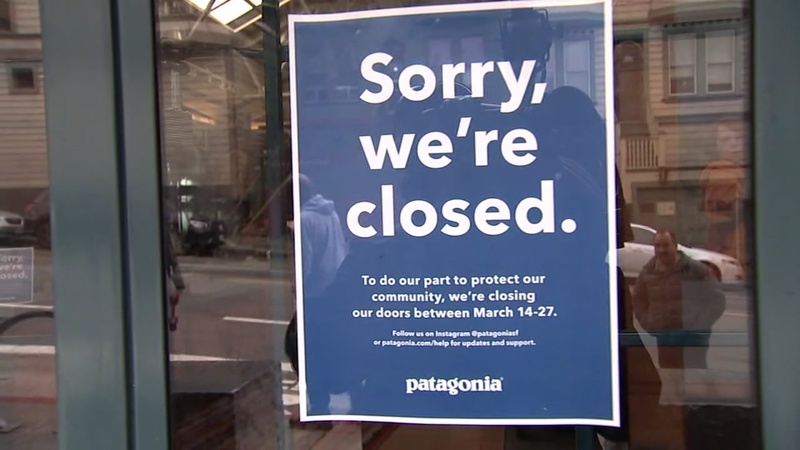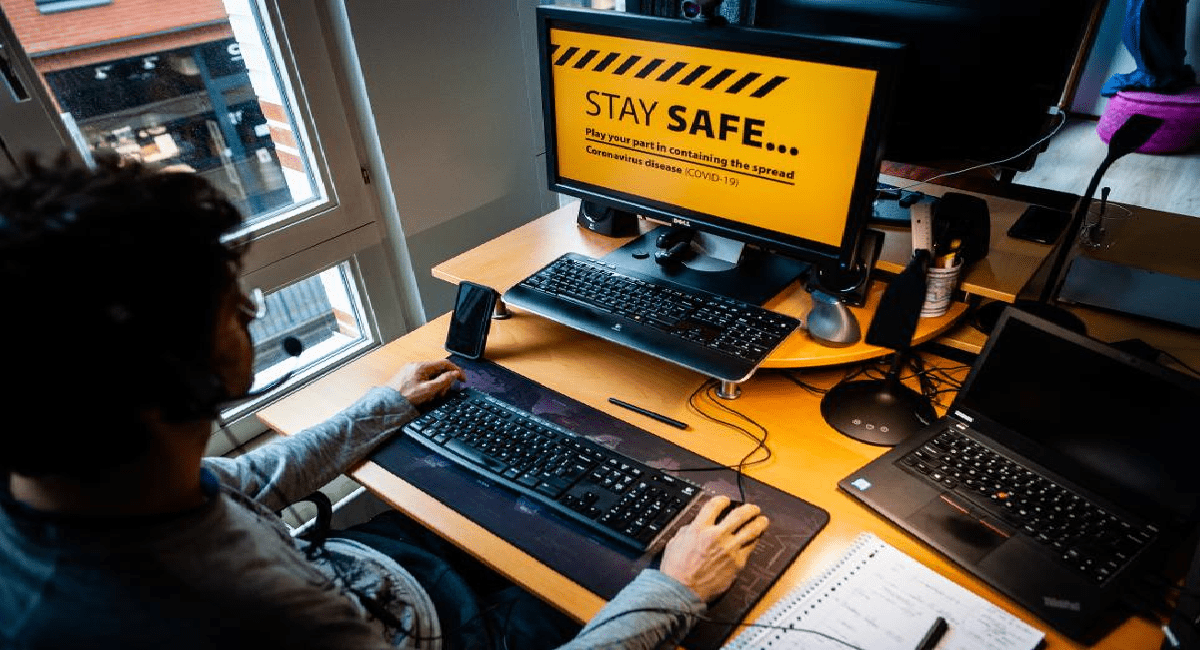Coronavirus: Between remote work & online classes, adjusting to a new reality
OPINION: MARCH 2020
The World Health Organization now reports 197,000 confirmed cases of coronavirus worldwide*, with 8,250 deaths reported. Accordingly, it is difficult not to find someone impacted by the crisis. Whether it is working from home, or studying online, we all need to rethink our habits, and come together in these time of uncertainty.
*Updated 8:48 AM ET, Wed March 18, 2020

America Closed: Thousands Of Stores, Resorts, Theaters Shut Down
In the age of ‘Working from Home”
Most of the workplaces are now impacted by the crisis, and are changing rapidly in response to COVID-19 in order to ensure the health and safety of their employees, their clients, and their communities while sustaining the core business. The main development, when feasible, has been in telework and remote work arrangements, with the aim of helping to “flatten the curve”, or limit and slow transmission of the virus through social distancing.
Not everybody can work from home, and we should all be mindful and support those who are keeping our communities going. For those who can, now is the time to work from home. This is crucial to limit the COVID-19 spread.
Whether you are a company, or an employee, there are a few key reminders and practice points to keep in mind when facing some of the biggest challenges such as mental health and workplace policies. Here are a few points:
⚠️Stay Home⚠️
— Archive: Governor Andrew Cuomo (@NYGovCuomo) March 17, 2020
⚠️Save Lives⚠️
Even if you have no symptoms, you can still spread #Coronavirus.
Do you part and help New York State #FlattenTheCurve. pic.twitter.com/zacUiTovsm
Be Mindful of Discrimination Risks
Employees cannot be treated differently on the basis on any protected characteristic, such as age, disability, or national origin. Employers should ensure that employees receive any necessary reasonable accommodations: for example, it is possible that a disabled employee may require special equipment at home in order to continue to perform the essential functions of the job.
More generally, employers must keep in mind the stresses faced by employees during uncertain times and the potential for stressful situations to negatively affect a company’s culture and morale. More than ever, it is essential to foster a sense of community while teleworking, and to promote the company’s policies such as the company’s commitment to a safe and respectful workplace.
Remember Employee Expense and Equipment Reimbursements
Employees may be eligible for reimbursement for cell phone, internet or equipment used in furtherance of the employer’s business. Not everybody has a printer at home, this is something any company must take in account while issuing work policies.
Take Cyber Risks Seriously
Remote work increases the risk for business disruptions and technological glitches. First and foremost, companies should make sure that they can handle remote work arrangements, such as running tests where employees log on simultaneously. To this effect, employers should anticipate and support its IT resources and staff.
Secondly, companies must be alert to potential cybersecurity risks. Be on the lookout for coronavirus phishing scams, like fake CDC updates or IT alerts, and make sure that to alert your employees of the same. Now might be the best time to invest in secure video or telephone conferencing systems and checking with vendors how to secure your company against cybersecurity threats.
Better Together: The International Lawyer launches a live chat in an effort to engage people online in time of isolation.
Maintaining a daily routine
Working at home is not a vacation, and you should maintain your daily routine: for example, brush your teeth and get dressed in normal clothes. At the end of the day, it’s important to project a certain image of how you want to be seen as a professional, and it may help your mental health, too. According to the American Psychological Association, “maintaining a daily routine can help both adults and children preserve a sense of order and purpose in their lives despite the unfamiliarity of isolation and quarantine.”
Most importantly, get out of bed. Try to create a space in your home devoted to working and take breaks, just like you would at the office. Check with your supervisor often to make sure nothing is lost in the distance. While this all can be tough, finding a strategy that works can help you make it through
Coronavirus and the challenges of online classes
Over 800 #StJohnsLaw students are taking 140 classes online taught by 39 full-time faculty members and 85 adjunct professors who are 100% dedicated to teaching, including @Klonick?Go Team! #lawschool #DistanceLearning #WeGotThis pic.twitter.com/DgtO2jaR84
— StJohnsLaw (@StJohnsLaw) March 12, 2020
As law schools move instruction out of the traditional classroom setting, many are moving into uncharted territory.
“Amidst all the disruption, uncertainty, and anxiety caused by COVID-19, the St.John’s University, School of Law has pulled off a complete transition to remote learning in a matter of days- an encouraging reminder that when we work together with a shared purpose, remarkable things are possible.” – Mike Simons, Dean of the law school.
“For the most part, we are trying to do everything we would normally do. We’ve been working really hard to get up to speed to figure out what will be the most helpful, and what will give students the same experience of the classroom, while sitting in their living room, ” – Mimi Samuel, co-director of Seattle University School of Law’s legal writing program.
So what are our advise in these time of online classes, here’s a few points:
For the teachers: Think Shorter and Engage with your students
It is hard to hold student’s attention in person, so imagine when online. The online setting tends to have shorter, more-compact opportunities. Some students might be logging from their smartphones, other might be watching a recording later instead of tuning in live. So now is the time to think shorter.
Another point is to engage with the students. There are many tools available to keep your students engaged: multiple-choice questions, text chat, etc. You can also use polls as an opportunities to interact during each online class session.
For the students: adapt yourself, don’t let a bad habit become handcuffs
The same rules apply to students studying from home: maintain your daily routine.
First, stay current with the reading. Odds are that you already have your casebook with a class syllabus laying out your assignments. So don’t take the interruption as an excuse to procrastinate and don’t fall behind. Even if class is remote, you will likely be facing a final exam and ultimately the Bar Exam.
Second, maximize your learning environment. If you don’t usually study at home, it is important to think about what you can do to make it more easy for you. It could be a lighting or a seating change, talking with your roommates and/or using noise-cancelling headphones.
Finally, engage with the course. You have to take real initiative to succeed: log in often, figure out the material, and be accountable to yourself for completing the work on time. It is easy to slip through the cracks. In this situation, it is even easier, as both you and your prof are dealing with being sick or caring for others, perhaps having kids underfoot, being trapped at home, etc.
Our advice: Demonstrate that you are doing your best. If you are having trouble accessing or need accommodation, or if you are really struggling, let the prof or school know.
Better Together: Engage with us online via our Live Chat. Just say hi!
Final Thoughts

While millions of Americans and Europeans are now learning to cope with changes to their daily lives brought on by coronavirus precautions, there are lessons we can learn from people who have been living with COVID-19 for months, such as in China.
This is a challenging time for our city — but New Yorkers are tough and resilient. Look out for your neighbors. If they need food, supplies or help, offer it. Be there for them.
— Mayor Bill de Blasio (@NYCMayor) March 17, 2020
We’ll get through this together.
Keep things in perspective. As any other crisis, this will pass. And don’t forget, when you hoard toilet paper and hand sanitizer, that life is a gift.
One testimony from a woman in Wuhan is about the sense of community she experienced during the quarantine. She, her family, and her neighbors know each other better. “Despite the reality, we should keep a spirit of gratitude and goodness at any time.”
Be there for others. We all have to make life adjustment, but there are other people truly struggling. People at risk financially, facing isolation, or facing the virus. We should all support our communities: check on your neighbor, call your mother, and think of people who can feel isolated. There are many ways to support each other, like online support. This is a time that should change us.
Keep your hands to yourself. Now is not the time to be selfish. When you’re outside, try not to touch things. You’ve heard it: wash your hands, take shower, play your part.
Stay on top of the latest news, but don’t fixate on it 24/7. The latest news have been stressful. Focus on your work and your family instead of watching the news constantly. Knowing what measures are in place in your local community is important, but it’s not healthy to be watching the news all the time. Turn off the news, put on some Netflix, read a book, occupy your mind with other things. Life still goes on.
We are all in this together. As an answer to the crisis, we have decided to open a 100% Free Live Chat on our website. Whether you are in the legal profession or not, talk to us, share your story with us and know that you are not alone. This is a growth opportunity and an opportunity to feel closer to each other.
Share, Like, Subscribe







